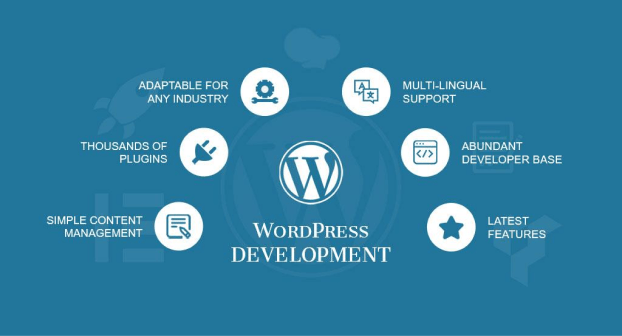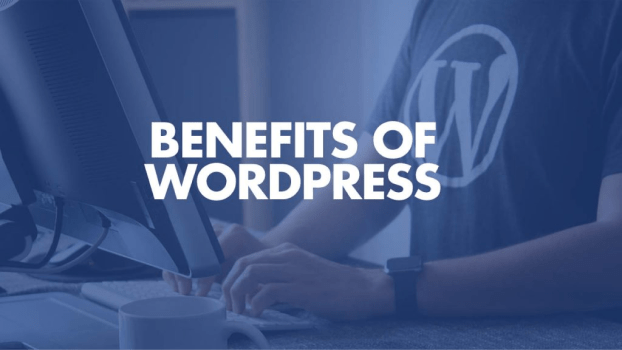WordPress is used by individuals, businesses, and organizations of all sizes, and powers more than 40% of all websites on the internet. Yes, you read it right, more than 40% of websites. Now you must be curious to know everything about it, and in this blog we will be doing exactly that.

An Overview of WordPress
WordPress is a content management system (CMS) that allows users to create and manage websites easily. It was first released in 2003 and has since become one of the most popular website platforms in the world.
WordPress is an open-source platform, which means that it is free to use and can be modified and customized by anyone. This has led to a thriving community of developers and designers who have created a vast array of plugins, themes, and other tools that can be used to enhance and extend the functionality of WordPress.
One of the key advantages of WordPress is its flexibility. It can be used to create a wide range of websites, including blogs, e-commerce stores, portfolios, membership sites, and more. It also offers a user-friendly interface that makes it easy for even non-technical users to create and manage content.
Another advantage of WordPress is its search engine optimization (SEO) capabilities. The platform is designed to be SEO-friendly, with features such as customizable URLs, built-in sitemaps, and easy integration with popular SEO plugins like Yoast SEO.
In addition, WordPress offers a range of other benefits for website owners, such as easy updates and maintenance, mobile responsiveness, and strong security features.
Overall, WordPress is a powerful and versatile website platform that offers a range of benefits for businesses and individuals looking to create an online presence. Its ease of use, flexibility, and SEO capabilities make it a popular choice for website owners around the world.
To give you an idea of how powerful it is, lets explore 10 Popular Websites Which Use WordPress
TechCrunch: One of the most popular technology news websites in the world, TechCrunch uses WordPress to power its website.
The New Yorker: A renowned magazine that covers a range of topics, including politics, culture, and business. The New Yorker uses WordPress to manage its content and publishing workflow.
Mercedes Benz: The luxury car brand uses WordPress to power its global website, which features an online shop, car configurator, and other interactive tools.
Vogue: The fashion and lifestyle magazine uses WordPress to power its website, which features articles, interviews, and multimedia content.
Sony Music: One of the largest music labels in the world, Sony Music uses WordPress to power its artist websites, online stores, and blogs.
Harvard Business Review: A leading business publication, Harvard Business Review uses WordPress to manage its website and publishing workflow.
The Walt Disney Company: The media and entertainment conglomerate uses WordPress to power its corporate website, which features news, investor relations information, and other content.
The White House: The official website of the President of the United States uses WordPress to manage its content and publishing workflow.
The Rolling Stones: The iconic rock band uses WordPress to power its website, which features tour dates, news, and other content.
Bloomberg Professional: The financial data and news platform uses WordPress to manage its website, which offers real-time market data, news, and analysis.
These are just a few examples of the many types of websites that can be created with WordPress. The platform’s flexibility and versatility make it an ideal choice for businesses and organizations of all sizes and industries.
WordPress is an open-source platform, which means that it is free to use and can be modified and customized by anyone. This has led to a thriving community of developers and designers who have created a vast array of plugins, themes, and other tools that can be used to enhance and extend the functionality of WordPress.
One of the key advantages of WordPress is its flexibility. It can be used to create a wide range of websites, including blogs, e-commerce stores, portfolios, membership sites, and more. It also offers a user-friendly interface that makes it easy for even non-technical users to create and manage content.
Another advantage of WordPress is its search engine optimization (SEO) capabilities. The platform is designed to be SEO-friendly, with features such as customizable URLs, built-in sitemaps, and easy integration with popular SEO plugins like Yoast SEO.
In addition, WordPress offers a range of other benefits for website owners, such as easy updates and maintenance, mobile responsiveness, and strong security features.
Overall, WordPress is a powerful and versatile website platform that offers a range of benefits for businesses and individuals looking to create an online presence. Its ease of use, flexibility, and SEO capabilities make it a popular choice for website owners around the world.
To give you an idea of how powerful it is, lets explore 10 Popular Websites Which Use WordPress
TechCrunch: One of the most popular technology news websites in the world, TechCrunch uses WordPress to power its website.
The New Yorker: A renowned magazine that covers a range of topics, including politics, culture, and business. The New Yorker uses WordPress to manage its content and publishing workflow.
Mercedes Benz: The luxury car brand uses WordPress to power its global website, which features an online shop, car configurator, and other interactive tools.
Vogue: The fashion and lifestyle magazine uses WordPress to power its website, which features articles, interviews, and multimedia content.
Sony Music: One of the largest music labels in the world, Sony Music uses WordPress to power its artist websites, online stores, and blogs.
Harvard Business Review: A leading business publication, Harvard Business Review uses WordPress to manage its website and publishing workflow.
The Walt Disney Company: The media and entertainment conglomerate uses WordPress to power its corporate website, which features news, investor relations information, and other content.
The White House: The official website of the President of the United States uses WordPress to manage its content and publishing workflow.
The Rolling Stones: The iconic rock band uses WordPress to power its website, which features tour dates, news, and other content.
Bloomberg Professional: The financial data and news platform uses WordPress to manage its website, which offers real-time market data, news, and analysis.
These are just a few examples of the many types of websites that can be created with WordPress. The platform’s flexibility and versatility make it an ideal choice for businesses and organizations of all sizes and industries.
How WordPress Works
WordPress works by using themes and plugins to customize the look and functionality of a website.
A theme is a collection of files that determine the design and layout of a website, while plugins are small programs that add new features and functionality to a website.
To get started with WordPress, you first need to purchase a domain name and web hosting. Once you have these, you can download the WordPress software from the official website and install it on your hosting server.
Once you’ve installed WordPress, you can log in to the WordPress dashboard, which is where you can manage your website’s content and settings. The dashboard provides a user-friendly interface for creating new pages and posts, adding images and other media, and customizing the design and functionality of your website.
To customize the design of your website, you can choose from thousands of free and premium WordPress themes that are available on the official WordPress theme directory or other theme marketplaces. You can also use page builders, which are plugins that provide drag-and-drop interfaces for creating custom page layouts and designs.
To add new features and functionality to your website, you can install plugins from the official WordPress plugin directory or other plugin marketplaces. Plugins can add features like e-commerce functionality, social media integration, contact forms, and much more.
Overall, WordPress provides a powerful and flexible platform for creating all types of websites, from blogs to e-commerce stores to corporate websites. Its ease of use and versatility have made it the go-to choice for businesses and organizations of all sizes and industries.sales.
A theme is a collection of files that determine the design and layout of a website, while plugins are small programs that add new features and functionality to a website.
To get started with WordPress, you first need to purchase a domain name and web hosting. Once you have these, you can download the WordPress software from the official website and install it on your hosting server.
Once you’ve installed WordPress, you can log in to the WordPress dashboard, which is where you can manage your website’s content and settings. The dashboard provides a user-friendly interface for creating new pages and posts, adding images and other media, and customizing the design and functionality of your website.
To customize the design of your website, you can choose from thousands of free and premium WordPress themes that are available on the official WordPress theme directory or other theme marketplaces. You can also use page builders, which are plugins that provide drag-and-drop interfaces for creating custom page layouts and designs.
To add new features and functionality to your website, you can install plugins from the official WordPress plugin directory or other plugin marketplaces. Plugins can add features like e-commerce functionality, social media integration, contact forms, and much more.
Overall, WordPress provides a powerful and flexible platform for creating all types of websites, from blogs to e-commerce stores to corporate websites. Its ease of use and versatility have made it the go-to choice for businesses and organizations of all sizes and industries.sales.


Benefits of WordPress for Business Owners
WordPress offers a wide range of benefits to business owners, including:
Ease of use: WordPress is designed to be easy to use, even for those who have no experience with website design or development. Its user-friendly interface and drag-and-drop page builders make it easy to create and manage your website’s content.
Customization: WordPress offers a wide range of themes and plugins that allow you to customize the look and functionality of your website. This means you can create a unique website that reflects your brand and meets your specific business needs.
SEO optimization: WordPress is built with SEO in mind, which means it provides the tools and features necessary to optimize your website for search engines. This includes features like customizable URLs, meta descriptions, and optimized content.
E-commerce functionality: WordPress offers a variety of e-commerce plugins that allow you to create an online store and sell products or services directly from your website.
Mobile responsiveness: WordPress themes are designed to be mobile responsive, which means they look great on all devices, from desktop computers to mobile phones.
Security: WordPress is a secure platform that receives regular updates and patches to keep it safe from security threats. Additionally, there are a variety of security plugins available that can help you protect your website from cyber attacks.
Scalability: WordPress is a scalable platform that can grow with your business. Whether you’re just starting out or have an established online presence, WordPress can accommodate your needs.
Overall, WordPress is a powerful and versatile platform that offers a wide range of benefits to business owners.
Its ease of use, customization options, and SEO optimization make it the perfect choice for businesses of all sizes and industries.
Customization: WordPress offers a wide range of themes and plugins that allow you to customize the look and functionality of your website. This means you can create a unique website that reflects your brand and meets your specific business needs.
SEO optimization: WordPress is built with SEO in mind, which means it provides the tools and features necessary to optimize your website for search engines. This includes features like customizable URLs, meta descriptions, and optimized content.
E-commerce functionality: WordPress offers a variety of e-commerce plugins that allow you to create an online store and sell products or services directly from your website.
Mobile responsiveness: WordPress themes are designed to be mobile responsive, which means they look great on all devices, from desktop computers to mobile phones.
Security: WordPress is a secure platform that receives regular updates and patches to keep it safe from security threats. Additionally, there are a variety of security plugins available that can help you protect your website from cyber attacks.
Scalability: WordPress is a scalable platform that can grow with your business. Whether you’re just starting out or have an established online presence, WordPress can accommodate your needs.
Overall, WordPress is a powerful and versatile platform that offers a wide range of benefits to business owners.
Its ease of use, customization options, and SEO optimization make it the perfect choice for businesses of all sizes and industries.
- Additional Resources: Discover how WordPress has transformed the web design industry and empowered businesses across various sectors in our blog post on 30+ WordPress Website Capabilities to help you Grow your Business.